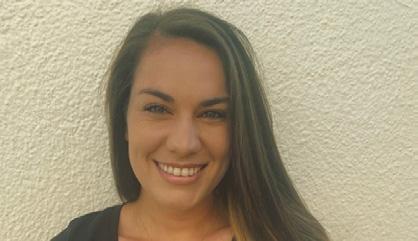
2 minute read
I Couldn't Do What You Do
I Couldn’t Do What You Do: ER Social Work in the Time of COVID-19
by Annie Wilson BSW ’15, LCSW
“I couldn’t do what you do” is a phrase I hear multiple times a week. Often by the patients and families that I am serving. I work as an Emergency Room social worker in a suburb of San Francisco. Truth is, my job challenges me in ways that I could have never imagined. It causes me to question the social constructs of our society and stand up to foundational systems that have been in place for decades. It leads me to question my intelligence, my compassion, and my ability to advocate for what is right on a regular basis.
I sit with a husband as he says goodbye to his lifelong partner. I sit with domestic violence survivors after acute battering incidents and hear them justify their partner’s behavior. I sit with a homeless family with four children who haven’t bathed properly in weeks. I sit with a sexual assault victim, prepare her for the next legal steps, and work to make her feel safe in her body again. I sit with a parent after he receives news that his son’s drug overdose was fatal.
How fortunate am I to be in a position to sit with someone in their most vulnerable time and provide tangible assistance? I have joined dozens of patients and family members in their battles. The battle changes every day and I can never anticipate what my shift will bring. It isn’t a surprise that my work on the frontline has intensified since the COVID-19 pandemic. I feel stuck trying to instill hope and a sense of security in an unsettling social climate. The resources are stretched and changing weekly as the need for them magnifies.
I see an immigrant who lost his job and his health insurance, finding himself hungry and on the street. I see concerned family members waiting in our parking lot for hours to hear any news, because they are unable to be present with their loved one at the bedside. I see an elderly woman unable to return to her assisted living facility because of the risk she poses to the other residents. I see more suicidal and homicidal ideation, more domestic violence, and more substance abuse. I have seen a lot, but what I have felt is more powerful.
I feel a sense of belonging from an organization that checks my temperature and ensures I have a mask every day. I feel inspired by the resiliency of my ER team, cheering each other on despite the anxiety that accompanies bedside care. I feel a sense of mutual understanding from our community partners, who are doing their best to be available for support despite the present constraints. I feel loved by members of the community who are sending multiple catered meals to the hospital units daily.
I am humbled to be among the healthcare heroes who are incessantly working to save lives. We are collectively faced with the uncertainty of this pandemic, yet we continue tirelessly to change people’s lives for the better. How often can someone say that walking away from their day job? Now when I hear the phrase “I couldn’t do what you do,” I smile.
Annie Wilson graduated from the University of Georgia with a BSW in 2015 and from San Diego State University with an MSW in 2016. In addition to her work in the emergency department, she provides telehealth counseling to individuals with anxiety and trauma-related disorders. Submitted photo.










